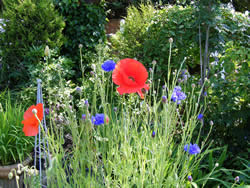
|
|||||||
The how to guide for first time gardenersUnderstand Your Garden:This might take a lot of self-control but ideally you should live with your garden as it is for a year so that you can get a better understanding of how it works, and what grows there. You need to understand where the sun falls, which areas are constantly in shade, and all of the little seasonal variations that your particular garden is subject to. It is only once you have understood the kind of space that you have that you will be able to properly plan for its development. It may seem like a very frustrating idea but you could well end up with this plot for a lifetime. A little bit of patience now will make all the difference in the long-run. Your Soil is Essential:One of the biggest mistakes that you can make with a new garden is to dive in without understanding exactly what kind of base you are working with. In an ideal world you will have perfect soil that is just waiting for you to work with, but it is also possible that you may need to dig over what is there and replace it with completely new soil. Whichever route you need to take, it is also extremely important to understand what kind of soil you have in terms of acidity and alkalinity. This can be done simply by picking up a soil-testing kit from any garden centre. This is an essential step because if you do have soil that is too high in alkaline or acid, you are going to have do something to combat that before you get down to working. Impose Your Style, But Know Your Limits:The most important thing here is to be realistic about the kind of garden you have. You may imagine your glorious garden as one that will be resplendent with blooming roses and tomatoes just waiting to be picked from the vine. The reality may be that you might live in the suburbs but your life still takes place mostly away from the home. A beautiful garden will not grow itself; it needs time and a lot of attention paid to it. You can still have a beautiful garden if you don't have time but it probably isn't the fairy tale one you see in your mind's eye right now. Get Planting:It is the moment of truth. You have studied your space in order to know how its cycle works, you have perfected your soil, and you have sensibly understood exactly what kind of garden you can realistically have; now you have some fun. When you first come to plant try to do so with things that you enjoy. That is, plant things you want to see, or vegetables that you would really like to eat. There is no easier way to give up on a garden than to follow somebody else's ideas just because it looks good in a magazine. If you feel a real connection with the space outside of the window you will come to really care about, and it will be you and your understanding of the space that grows along with all of the lovely plants and vegetables. You'll be so happy with it that you will enjoy getting down on your hands and knees on those garden mats and interacting with a place that is truly something that you can proud of, and one that is all of your own making. The article was written by Alisha Webb. Alisha is a British writer and content developer for Turtle Mat. |
|||||||
|
DISCLAIMER: We cannot guarantee that these links will work all of the time |
|||||||
Submit a Free Link | Advertise your Business | Privacy Policy

